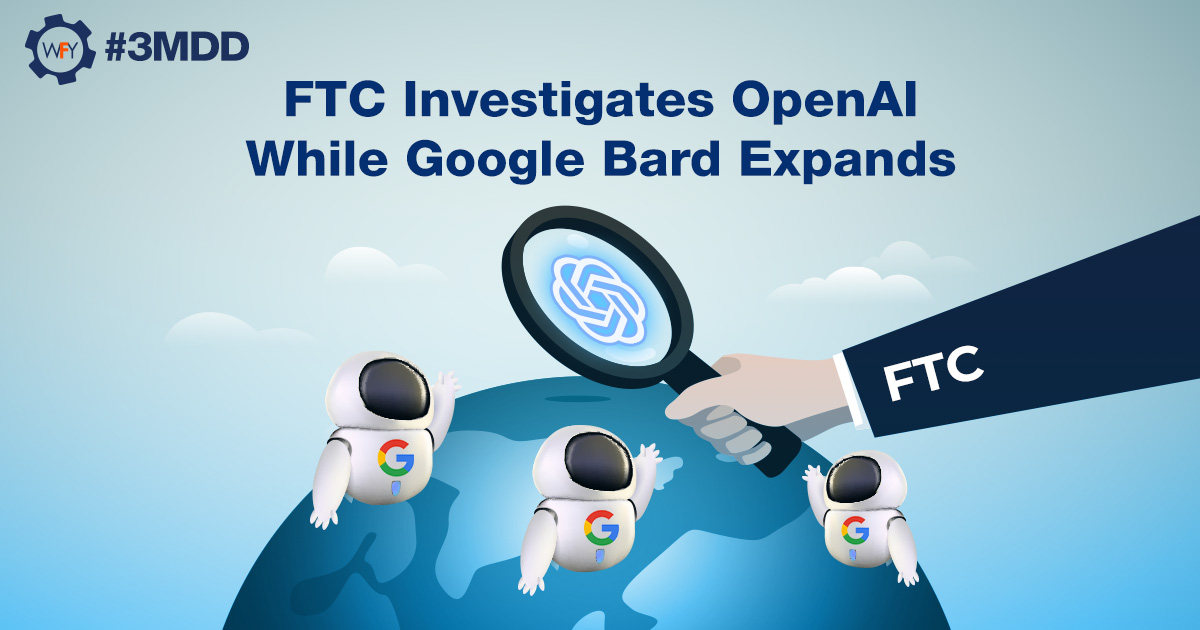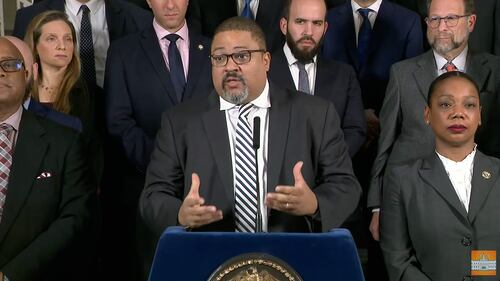FTC Investigates OpenAI's ChatGPT: What It Means For AI

Table of Contents
The FTC's Concerns Regarding ChatGPT and AI Safety
The FTC's investigation into OpenAI's ChatGPT stems from serious concerns about the safety and ethical implications of this powerful technology. The investigation isn't simply about OpenAI; it sets a precedent for how the government will approach the regulation of increasingly sophisticated AI systems.
Data Privacy Issues
The FTC is deeply concerned about ChatGPT's data collection practices. The model's training relies on vast datasets, raising questions about whether OpenAI has adequately protected user privacy. The use of personal data without explicit and informed consent is a major point of contention, potentially violating regulations like the General Data Protection Regulation (GDPR) in Europe and the California Consumer Privacy Act (CCPA) in the US.
- Potential privacy violations: The unintentional exposure of sensitive personal information through prompts and responses.
- Scale of data collected: The sheer volume of data used to train ChatGPT and the potential for re-identification of individuals.
- OpenAI's response: The company's efforts to address privacy concerns and improve data security protocols are under scrutiny.
Misinformation and Bias in AI Models
Another key area of concern for the FTC is the potential for ChatGPT to generate misleading or biased information. Large language models like ChatGPT learn from the data they are trained on, which can include biases present in the original data. This can lead to outputs that perpetuate harmful stereotypes or spread misinformation.
- Examples of biased outputs: ChatGPT generating sexist or racist remarks, providing inaccurate information, or reinforcing harmful stereotypes.
- Difficulties in fact-checking AI-generated content: The challenge of verifying the accuracy of information produced by AI, particularly when the source is unclear or manipulated.
- Potential solutions: Improved data curation, algorithmic bias detection, and the development of tools for fact-checking AI-generated content.
Consumer Protection and Responsible AI Development
The FTC's investigation emphasizes the need for responsible AI development and robust consumer protection. This includes ensuring transparency and accountability in how AI systems are developed and deployed. Clear terms of service, robust data security measures, and independent audits are crucial for building consumer trust and mitigating potential harm.
- Potential consumer harm: The spread of misinformation, identity theft, financial fraud, and other harms stemming from the misuse of AI.
- The need for clear terms of service: Users need to understand how their data is being collected, used, and protected.
- The role of independent audits: Regular audits can help ensure that AI systems are developed and used ethically and responsibly.
Potential Impacts of the Investigation on the AI Landscape
The FTC's investigation into OpenAI's ChatGPT will have far-reaching implications for the entire AI industry. It signals a new era of increased scrutiny and regulation for AI companies.
Increased Scrutiny of AI Companies
The ChatGPT investigation is likely to lead to increased regulatory oversight of other AI companies developing and deploying similar technologies. This could mean stricter compliance requirements, more rigorous data privacy protections, and greater transparency around AI algorithms and data usage.
- Other AI companies that might be affected: Companies developing large language models, AI-powered chatbots, and other AI-driven applications.
- Increased transparency requirements: Companies might be required to disclose more information about their AI systems, including their data sources, algorithms, and potential biases.
- Potential for slowing down innovation: Increased regulation could potentially slow down the pace of AI innovation, but it could also encourage the development of more responsible and ethical AI systems.
The Evolution of AI Regulation
The investigation could significantly shape the development of AI regulations globally. International collaboration will be crucial to establish consistent standards for responsible AI development and deployment. This could lead to new laws, international agreements, and potentially even a global AI regulatory body.
- Examples of ongoing legislative efforts: The EU's AI Act, the US's Algorithmic Accountability Act, and other national and regional initiatives.
- Potential future regulations: Regulations focusing on data privacy, algorithmic transparency, bias mitigation, and consumer protection.
- The need for a balanced approach: Regulations must strike a balance between fostering innovation and mitigating the risks associated with AI.
Implications for AI Research and Development
The FTC investigation will undoubtedly influence future AI research and development. There's a growing need for research into AI ethics, safety, and societal impact. This includes focusing on techniques for mitigating bias, ensuring fairness, and promoting transparency in AI systems.
- Potential shifts in research priorities: Increased focus on ethical AI, explainable AI, and responsible AI development.
- The importance of ethical considerations: Integrating ethical considerations throughout the entire AI development lifecycle, from data collection to deployment.
- The need for interdisciplinary collaboration: Bringing together computer scientists, ethicists, social scientists, and policymakers to address the complex challenges of responsible AI.
Conclusion: The Future of AI in Light of the FTC's ChatGPT Investigation
The FTC's investigation into OpenAI's ChatGPT highlights the critical need for responsible AI development and robust regulation. The concerns raised regarding data privacy, misinformation, and consumer protection are not unique to ChatGPT; they underscore the broader challenges associated with deploying powerful AI systems. The investigation's outcome will significantly shape the future of AI regulation and the direction of AI research. To stay informed about this crucial development, follow the FTC's investigation into OpenAI's ChatGPT, learn more about responsible AI development, and stay informed about the future of AI regulation. The long-term impact of this investigation will determine how AI is developed and used, ensuring its benefits are realized while mitigating its risks.

Featured Posts
-
 Exec Office365 Breach Millions Made Feds Say
Apr 22, 2025
Exec Office365 Breach Millions Made Feds Say
Apr 22, 2025 -
 Ukraine Faces Intense Russian Aerial Barrage As Us Proposes Peace Plan
Apr 22, 2025
Ukraine Faces Intense Russian Aerial Barrage As Us Proposes Peace Plan
Apr 22, 2025 -
 Google Vs Doj Back In Court Over Search Monopoly Concerns
Apr 22, 2025
Google Vs Doj Back In Court Over Search Monopoly Concerns
Apr 22, 2025 -
 Razer Blade 16 2025 Ultra Thin Gaming Laptop Review Performance And Price Analysis
Apr 22, 2025
Razer Blade 16 2025 Ultra Thin Gaming Laptop Review Performance And Price Analysis
Apr 22, 2025 -
 Trumps Trade Offensive And The Future Of Us Financial Primacy
Apr 22, 2025
Trumps Trade Offensive And The Future Of Us Financial Primacy
Apr 22, 2025
